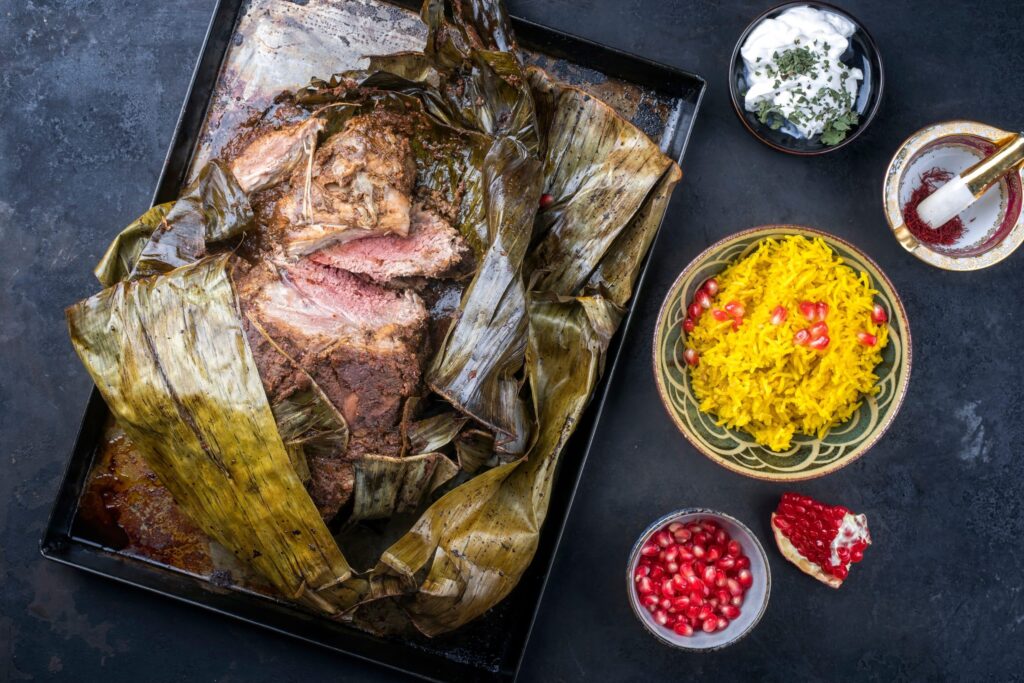
Shuwa, a national dish of Oman, is a culinary delight that has been savored for centuries. This traditional Omani delicacy is more than just a meal—it’s an integral part of the country’s cultural heritage and social fabric.
Our team at Remitly created this guide as part of our series that celebrates the cuisine of our consumers around the world.
The History of Shuwa
The origins of Shuwa are deeply rooted in Oman’s history. It was developed by Bedouin tribes who roamed the Arabian Peninsula hundreds of years ago. These nomadic people needed a cooking method that could preserve meat for extended periods—thus, Shuwa was born.
Over time, this cooking technique evolved into an elaborate process that became synonymous with hospitality and celebration in Omani culture. Today, it remains a cherished tradition, often prepared during special occasions and festivities.
Ingredients Used in Shuwa
Shuwa primarily involves slow-cooking lamb or goat over several hours or even days. The meat is marinated with a blend of spices including garlic, coriander, cinnamon, cardamom, and nutmeg—each contributing to its distinctive flavor profile.
The choice of meat varies depending on regional preferences and availability. However, regardless of the type used, the result is always tender meat infused with rich flavors from the marinade and slow-cooking process.
Recipe for Shuwa
Creating an authentic Omani Shuwa at home might be a challenge due to the traditional sand oven cooking method. However, you can still prepare a version of this dish using your oven or slow cooker. Here’s a simplified recipe that captures the essence of Shuwa.
Ingredients
- 1 whole lamb or goat (you can also use cuts like shoulder or leg)
- 10 cloves of garlic
- 2 tablespoons coriander seeds
- 1 tablespoon cinnamon powder
- 1 tablespoon cardamom pods
- 1 teaspoon nutmeg
- Salt to taste
- Olive oil
Instructions
- Start by preparing the marinade. Crush the garlic, coriander seeds, and cardamom pods in a mortar and pestle until they form a paste.
- Add the cinnamon, nutmeg, and salt to this paste and mix well.
- Rub this spice mixture all over the meat. Make sure it’s well coated.
- Cover the meat and let it marinate overnight in the refrigerator.
- The next day, preheat your oven to its lowest setting or prepare your slow cooker.
- Place the marinated meat in your cooking vessel and cook for several hours until tender—the exact time will depend on your cooking method and size of meat.
- Once cooked, allow it to rest before serving with rice.
Remember: This is just an approximation of Shuwa as traditionally prepared in Oman—there’s no substitute for experiencing this dish cooked in its original style.
Variations of Shuwa Across Oman
While there are common elements in preparing Shuwa across Oman, regional variations exist. Some regions prefer to use specific types of meat or include additional ingredients in their marinade.
For instance, in some coastal areas, fish is used instead of lamb or goat. Regardless of these variations, the essence of Shuwa—slow-cooked meat infused with a blend of spices—remains consistent throughout the country.
Serving and Eating Etiquette for Shuwa
When it comes to serving Shuwa, it’s typically presented on a large platter accompanied by rice and garnished with nuts and raisins. It’s customary to eat Shuwa using your hands—a practice that adds to the communal dining experience.
Remember, when eating with your hands in Oman, always use your right hand as per local customs. This etiquette is an important part of Omani culture and shows respect towards your hosts.
Popular Occasions for Serving Shuwa
Shuwa is often reserved for special occasions such as weddings, religious holidays, and community gatherings. Its preparation involves communal effort—an embodiment of Omani hospitality and unity.
The process of preparing Shuwa brings people together—from digging the sand oven to cooking and finally sharing the meal—it’s a social event that strengthens community bonds.
Influence of Shuwa on Omani Cuisine
Shuwa holds a significant place in Omani cuisine. Its unique preparation method sets it apart from other dishes and showcases the culinary ingenuity inherent in Omani culture.
Moreover, its prominence during celebrations underscores its cultural importance. The dish not only offers gastronomic pleasure but also serves as a symbol of Omani heritage and hospitality.
Exploring the Global Presence of Shuwa
While deeply rooted in Oman, Shuwa has found its way into kitchens around the world. Food enthusiasts globally appreciate this dish for its unique flavors resulting from slow-cooking techniques combined with aromatic spices.
Despite its global presence, experiencing authentic Shuwa in Oman, prepared traditionally in a sand oven, remains an unmatched culinary experience. It’s a testament to the rich cultural heritage of Oman and its warm hospitality.
Omani Cuisine: A Culinary Journey
Omani cuisine reflects a rich culinary history influenced by Arabian, Persian, Indian, African, and Mediterranean cultures—a testament to Oman’s strategic location along ancient trade routes.
Staple Foods
Rice is central to many Omani dishes—often flavored with saffron or turmeric and served with meat, fish, or vegetables. Dates are another staple, enjoyed as a snack or used in desserts.
Seafood
Given its extensive coastline, seafood plays a significant role in Omani cuisine. Fish is often grilled, fried, or cooked into curries. Shrimp and lobster are also popular.
Spices
Spices are integral to Omani cooking—cardamom, cinnamon, saffron, turmeric, and coriander are commonly used. These spices lend depth of flavor to dishes and reflect the country’s trade history.
Traditional Dishes
Beyond Shuwa, other traditional dishes include Majboos (a spiced rice dish), Harees (a wheat-based dish), and Mashuai (a rice and fish dish). Each offers a unique taste of Oman’s culinary landscape.
Sweets & Beverages
Omanis have a sweet tooth—Halwa is a beloved dessert made from rosewater, saffron, ghee, sugar, and various nuts. As for beverages, coffee flavored with cardamom is a favorite.
Omani cuisine offers an exciting gastronomic journey—one that tells the story of its rich cultural heritage through every bite.
Visit the homepage, download our app, or check out our Help Center to get started.